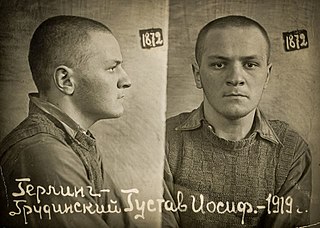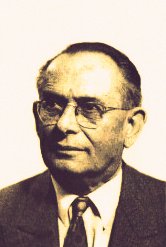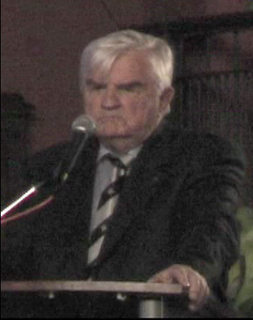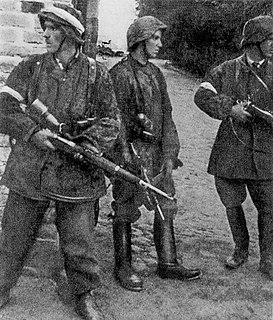 W
WFrantsishak Alyakhnovich was a Belarusian writer, journalist of Szlachta origins.
 W
WHeinz Baumkötter was an SS-Hauptsturmführer and concentration camp doctor in Mauthausen, Natzweiler-Struthof and Sachsenhausen, who conducted medical experiments on concentration camp inmates.
 W
WMenachem Begin was an Israeli politician, founder of Likud and the sixth Prime Minister of Israel. Before the creation of the state of Israel, he was the leader of the Zionist militant group Irgun, the Revisionist breakaway from the larger Jewish paramilitary organization Haganah. He proclaimed a revolt, on 1 February 1944, against the British mandatory government, which was opposed by the Jewish Agency. As head of the Irgun, he targeted the British in Palestine. Later, the Irgun fought the Arabs during the 1947–48 Civil War in Mandatory Palestine and its chief Begin was also noted as "leader of the notorious terrorist organisation" by the British government and banned from entering the United Kingdom.
 W
WEugeniusz Bodo was a film director, producer, and one of the most popular Polish actors and comedians of the interwar period. He starred in some of the most popular Polish film productions of the 1930s, including His Excellency, The Shop Assistant, Czy Lucyna to dziewczyna?, and Pieśniarz Warszawy.
 W
WKurt Eccarius was an SS functionary during the Nazi era; he was in charge of the prison block inside the Sachsenhausen concentration camp from 1939 to 1945. He was convicted by both Soviet and West German courts for murders committed during his concentration camp service.
 W
WHenryk Ehrlich was an activist of the General Jewish Labour Bund in Poland, a Petrograd Soviet member, and a member of the executive committee of the Second International.
 W
WLovett Huey Fort-Whiteman (1889–1939) was an American political activist and Communist International functionary. The first black American to attend a Comintern training school in the Soviet Union in 1924, Fort-Whiteman was later named the first national organizer of the American Negro Labor Congress, a mass organization of the Communist Party, USA. Fort-Whiteman was once called "the reddest of the blacks" by Time magazine.
 W
WOsvald Harjo was a Norwegian resistance member during World War II, and a prisoner in Soviet Gulag camps for more than a decade.
 W
WGustaw Herling-Grudziński was a Polish writer, journalist, essayist, World War II underground fighter, and political dissident abroad during the communist system in Poland. He is best known for writing a personal account of life in the Soviet Gulag entitled A World Apart, first published in 1951 in London.
 W
WVictor Herman was a Jewish-American who spent 18 years as a Soviet prisoner in the Gulags of Siberia. At 16 years of age, his family went to work in the Soviet Union in the early 1930s but who met tragic fates during the Stalin purges. He briefly held the world record in 1934 for the highest parachute jump and became known as the 'Lindbergh of Russia'.
 W
WBruno Jasieński pronounced [ˈbrunɔ jaˈɕeɲskʲi], born Wiktor Bruno Zysman, was a Polish poet, novelist, playwright, Catastrophist, and leader of the Polish Futurist movement in the interwar period. Jasieński was also a communist activist in Poland, France and the Soviet Union, where he was executed during the Great Purge. He is acclaimed by members of the various modernist art groups as their patron. An annual literary festival Brunonalia is held in Klimontów, Poland, his birthplace, where one of the streets is also named after him.
 W
WRyszard Kaczorowski, GCMG was a Polish statesman. From 1989 to 1990, he served as the last President of Poland-in- exile. He succeeded Kazimierz Sabbat, and resigned his post following Poland's regaining independence from the Soviet sphere of influence and the election of Lech Wałęsa as the first democratically elected President of Poland since before the Second World War.
 W
WAnton Kaindl was an SS-Standartenführer and commandant of the Sachsenhausen concentration camp from 1942-1945.
 W
WWładysław Kochański Władysław Kochański was an infantry captain in the Polish Army during World War II. He was then part of the Polish resistance army Armia Krajowa after Germany occupied Poland, leading the Cichociemni special forces paratrooper resistance unit, and was one of the leading organizers of the Polish defense of Volhynia.
 W
WAdam Kossowski was a Polish artist, born in Nowy Sącz, notable for his works for the Catholic Church in England, where he arrived in 1943 as a refugee from Soviet labour camps and was invited in 1944 to join the Guild of Catholic Artists and Craftsmen.
 W
WSavić Marković Štedimlija was a Montenegrin writer. He studied the history of Croatia and was an associate of the Lexicographic Institute in Zagreb. During his life, he authored more than 20 books and a number of articles, and also worked as a literary critic. Štedimlija is also known as editor-in-chief of publications promoting the Croatian Orthodox Church of Ustaše regime.
 W
WZenzl Mühsam was a political activist who was involved, with her husband, Erich Mühsam, in the Munich Soviet of 1919.
 W
WHerminia Naglerowa was a Polish writer and publicist.
 W
WJohn H. Noble was an American survivor of the Soviet Gulag system, who wrote two books which described his experiences in it after he was permitted to leave the Soviet Union and return to the United States.
 W
WBeata Obertyńska,, born July 18, 1898, near Skole, died May 21, 1980 in London was a Polish writer and poet.
 W
WWladyslaw Ossowski, was a Polish boyscout and member of the White Couriers.
 W
WStanisław Ostrowski was a Polish politician, best known for serving as the last Polish Mayor of Lwow, and was President of Poland-in-exile.
 W
WReginald Eric Pleasants was a British national who joined the Waffen-SS serving in the British Free Corps during the Second World War.
 W
WPrince Hieronim Mikołaj Radziwiłł (1885–1945) was a Polish aristocrat, landlord in Balice. Radziwiłł was a great-grandson of Prince Maciej Radziwiłł. He and his children carried the style of Serene Highness.
 W
WJános Rózsás was a Hungarian writer.
 W
WEustachy Kajetan Sapieha was a Polish nobleman, prince of the Sapieha family, politician, Polish Minister of Foreign Affairs, and deputy to the Polish parliament (Sejm).
 W
WMoses Schorr, Polish: Mojżesz Schorr was a rabbi, Polish historian, politician, Bible scholar, assyriologist and orientalist. Schorr was one of the top experts on the history of the Jews in Poland. He was the first Jewish researcher of Polish archives, historical sources, and pinkasim. The president of the 13th district B'nai B'rith Poland, he was a humanist and modern rabbi who ministered the central synagogue of Poland during its last years before the Holocaust.
 W
WEmil Sommerstein was a Polish-Jewish lawyer, philosopher, activist and politician.
 W
WKarlo Štajner was an Austrian-Yugoslav communist activist and a prominent Gulag survivor. Štajner was born in Vienna, where he joined the Communist Youth of Austria, but emigrated to the Kingdom of Serbs, Croats and Slovenes in 1922 on the order of the Young Communist International to help the newly established Communist Party of Yugoslavia. After an illegal communist printing house in Zagreb where Štajner worked was searched by the police in 1931, he fled Yugoslavia, visiting Paris, Vienna, and Berlin before finally settling in the Soviet Union in 1932 where he worked in the Comintern publishing house in Moscow. During the Great Purge in 1936, Štajner was arrested and spent the next 17 years in prisons and gulags and three more years in exile in Siberia. He was released in 1956 after being rehabilitated, and returned to Yugoslavia. He spent the rest of his life in Zagreb with his wife Sonya whom he married in Moscow in the 1930s.
 W
WGünter Stempel was a German politician (LDPD). He was involved in the formation of the German Democratic Republic (GDR), despite which he was a victim of political repression in both the GDR and the USSR.
 W
WStanisław Swianiewicz was a Polish economist and historian. A veteran of the Polish-Bolshevik War, during World War II he was a survivor of the Katyn Massacre and an eyewitness of the transport of Polish prisoners of war to the forests outside Smolensk by the NKVD.